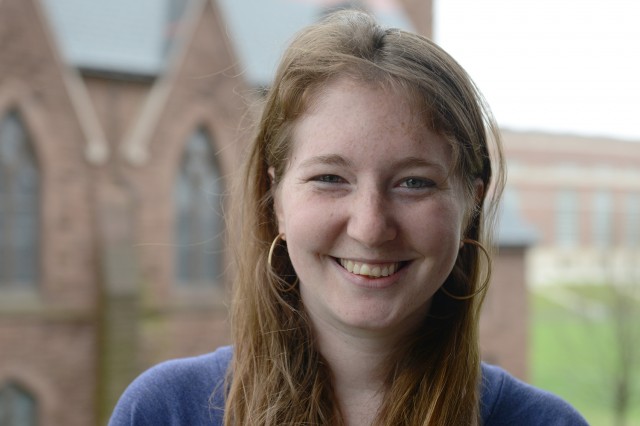Weitzman ’14 to Study Slam Poetry as Watson Fellow

Emily Weitzman ’14, a double major in English and dance and an original member of Wesleyan’s slam poetry team (WeSlam), will travel around the world studying slam poetry, community and culture under a Thomas J. Watson Fellowship.
Weitzman plans to visit South Africa, Australia, Malaysia, Singapore, Nepal and Ireland to explore communities of slam poets. She was one of about 40 individuals this year to receive the prestigious fellowship, which comes with a $28,000 stipend for travel and independent study. She will begin her year-long journey by August 1.
“While my proposed topic is slam, something that I really love about the Watson is that it’s not so much about your project as it is about your experience while pursuing a project. The Watson says that they ‘pick people, not projects,’” she said. “Just like slam is a vehicle for sharing art, my project is a vehicle for experiencing the world, and the people and art across the globe. So for me, pursing this project is really about meeting new people, learning about diverse cultures, immersing myself in different places, and experiencing the art created in different communities. It’s also probably about a whole bunch of things that I don’t even know yet.”
Weitzman became interested in slam poetry during her freshman year at Wesleyan, when Michael Rosen ’11 founded WeSlam, a performance poetry team that competes regionally and nationally. Weitzman has been part of all four teams in WeSlam history that have competed in the College Union Poetry Slam Invitational (CUPSI); in 2011, she won “Best Persona Poem” for a group piece performed with Randyl Wilkerson ’12, and in 2012, won “Funniest Poem” for her poem “Couch.” (Watch a video of Weitzman performing “Couch” at the Yale Regionals in 2012).
“Building a relationship with a small group of five teammates plus one coach, and sustaining that relationship over a semester, allows you to grow so much as a writer, and to learn about your teammates as writers and as people. We end up knowing each other’s poems just as well as our own,” she said. The competitions, she added, are all about “sharing your art, meeting new people, collaborating with a team, and becoming an artistic community, like a family. We call this ‘slamily.’”
Weitzman got the idea for the Watson project last summer while spending time in Mombasa, Kenya under an Olin Fellowship to conduct research for her English thesis.
“I spent a few hours online searching, and I was surprised how many cities around the world seemed to have slams and other performance poetry events,” Weitzman said. She began contacting people involved in the slams, many of whom were extremely receptive and welcoming. “Since I was notified about the Watson, I have been conducting more research, and I have found other places to potentially visit. The Watson acknowledges that you can plan all you want but things will change when you get there – so I could end up revising my list of countries.”
In each location, Weitzman plans to attend as many slams and poetry events as possible; interview poets; and learn about and experience the country and culture.
“Slam is all about identity and exploring who you are, so the place you come from is an important part of that. By immersing myself in the culture of each place, I hope to better understand what elements of slam poetry are universal and what elements are culturally diverse,” she said. “I will ask questions such as: How do culture, socio-economic status, and political environments shape poetry topics, language, performance styles, and slam communities themselves? How do poets represent themes of race, gender, sexuality, class, and religion? Why do poets choose to perform, and what are they writing about? Can diverse voices be heard? How do poets express identities, experiences, and beliefs? The nature of performance poetry is to present an intimate look into the lives of the poets, so how does experiencing poetry communities in vastly different cultural contexts provide insights into the lives of people in each country?”
Weitzman also hopes to help with outreach efforts of slam communities, such as teaching performance poetry in schools, organizing youth slams, or holding poetry workshops for the community. She also plans to do some side projects, like taking photos, “and then trying to relate other forms of art and expression to the experiences I have with poetry.
The title of Weitzman’s Watson project is, “The Points are Not the Point: Slam Poetry, Community, and Culture.
In the U.S., she explained, poetry slam competitions were started to make poetry accessible, interactive and attractive to those who would not normally watch poetry. “And I think this idea really has worked. At Wesleyan, we attract anywhere from 200 to 400 students to attend our final slam on a Saturday night,” she said.
But for the poets, she added, “‘The point is the poetry,” as we say. Slam poetry can provide the cathartic feeling of self-expression, promote the formation of artistic community, and generate heated and exciting discussions. Communicating our stories can reveal differences, but can also reveal how much we share. I think the power or ‘point’ of poetry slam is its ability to bring people together. The point is sharing something on stage in front of an audience of strangers – maybe something you thought you would feel too vulnerable to say to your closest friends. The point is learning from people with identities very different from your own – I attribute much of what I have learned over the past few years to stories poets have shared with me through their poetry.”
In the long run, Weitzman plans to become a teacher and to continue writing, though she’s not sure if she will pursue writing professionally, teach it, or just do it for fun.
Wesleyan previously has had 14 Watson fellows.
Watch a 2011 video on the WeSlam team here.

